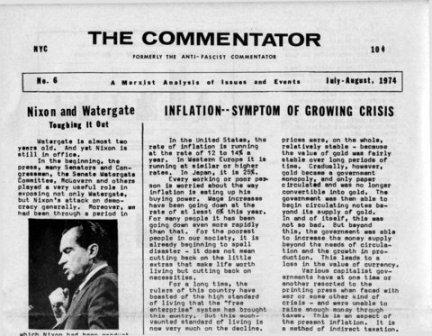
Published: The Commentator, No. 6, July-August 1974.
Transcription, Editing and Markup: Paul Saba
Copyright: This work is in the Public Domain under the Creative Commons Common Deed. You can freely copy, distribute and display this work; as well as make derivative and commercial works. Please credit the Encyclopedia of Anti-Revisionism On-Line as your source, include the url to this work, and note any of the transcribers, editors & proofreaders above.
There will be a revolution in the United States one day. Even now conditions are beginning to ripen for it, what with U.S. imperialism being undermined from without by the liberation struggles in the Third World, and being undermined from within by a developing economic crisis in the capitalist world. The long period of prosperity after World War II based on U.S. hegemony in the world is coming to an end.
But even this ripening will not take place overnight, and conditions for revolution are far from being ripe today. The majority of working people are just beginning to wake up, to fight, to take interest in politics. The majority will have to go through a great many struggles before they will be ready to make the sacrifices needed for a revolutionary struggle. U.S. imperialism will need to weaken itself considerably more before a successful revolutionary struggle from within can be made against it.
A minority of people in the United States are closer to being ready for revolution than the majority – namely the Black and other third world people in the U.S. A certain still small section of the students also, and perhaps a few others imagine themselves to be closer still to being ready.
But a successful revolution cannot be made by a minority. A revolution must be made by the masses of people.
It has happened often in recent years that a small handful of self-styled revolutionaries have imagined that by bold action, by taking up arms or whatever, they could “incite the masses to revolution, or at least the third world people, because they have laid down their lives for what they believe in. But they have failed. They have failed because not even the third world people are as ready for revolution as they imagine. They have failed because in any case, a revolution cannot be made with a minority of the people.
To a certain extent, these revolutionaries have sensed that they were going to fail, and yet went ahead anyway to “die gloriously”. One cannot help feel that this was done out of a lack of faith that the people would ever be ready for revolution, out of a lack of faith that the working class in this country could ever become revolutionary and able to lead the people in revolution. One cannot help but feel that these people overestimated the strength of this system, did not realize that it would not always have the strength to use against the people that it still retains today.
Someday what we will need more than anything else will be the courage to “die gloriously”, and those that lack this courage will be inglorious indeed. Those liberals and phony revolutionaries that imagine that basic change can be brought about without violence, without revolution will prove to be traitors to the revolution. Both the War of Independence, and the Civil War, the two periods of fundamental and basic change in our nation’s history were violent, bloody struggles, because those that oppressed the people, who resisted change would have it no other way.
But today, a different kind of courage is needed. Today what is needed chiefly is not the courage to “die gloriously” but to live and fight in less spectacular ways, to persevere, to be ready to fight for a long time in building a new revolutionary party of the working people, communist party, to be ready to educate and struggle with and be educated by the working people, to study and learn the laws of revolution in the U.S.
Both the Revolutionary War of Independence and the Civil War were proceeded by long years of less spectacular activity, of preparation. Very few people were even in favor of independence ten years before that struggle. So it was in all great revolutions. The socialist revolution in the U.S. will be no different in that respect. Taking up arms is the last act of the revolution, not the first. The people will have to go through many struggles before they are ready to take up arms. At first, some of these struggles may not appear very militant. And yet, they can help move people forward.
To be a revolutionary today means to be a Marxist-Leninist. To be a Marxist-Leninist means to recognize the leading role of the working class. When the working class is not yet revolutionary, to recognize the leading role of the working class means to strive to prepare the working class to play a leading role, to recognize that the revolution is not yet at hand until the working class is prepared to play a leading role.
If we have faith in victory, if we have faith in the workers, we will never settle for a few reforms, a few crumbs, and we will never settle for “glorious” but meaningless deaths.